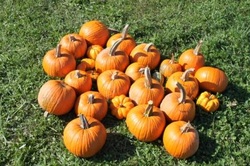
Thank you so much to one of our parent chaperons for sending along this batch of photos from the field trip. It seemed easier to make a new slideshow than to add them to the first one, so I hope you don't mind checking two places for views of your child on the field trip!
Also, I received some very good questions about the word study homework from one student's parents. I'm guessing that they are probably not alone in wondering about the oddball words, so I will copy my answer to them here, to share with all of you. Please note, however, that the word lists are differentiated according to the children's spelling needs. We will discuss this in more detail at our conference, but please know that not everyone has the same list.
We have reviewed the sorts in class, including the oddballs, but it takes awhile to get used to the concept. In a few weeks, all of this should be very routine for your children. Here is a quick summary:
The oddball words are the ones that look like they should belong in the main feature categories, but they don't sound right. So, one group's words this week are sorting CVC (consonant-vowel-consonant) words with short /a/ sounds and short /o/ sounds. 'Cat' and 'sock' are the headers. Jam, had, cab, ran, sad, map, and ham all belong under the heading 'cat.' 'Was' looks like it should belong there, but it's different. It's an oddball. Likewise, hot, mop, fox, box, mom, lot, etc, all belong under 'sock.' They all have a short /o/ sound in the middle of the word. 'Boy' looks like it should belong there, since it has an o in the middle position, but it's a different sound. It's an oddball.
For that set of words, 'was' and 'boy' are the only oddballs. If a word sort includes oddballs, they usually only have a small number, just to highlight the contrast. Spelling patterns in English can be so helpful, but it is critical to remember that there are exceptions. I hope that in older grades they discuss the reasons behind the exceptions, but for us, it's enough just to know that exceptions exist.
The spelling test on Friday will consist of ten words selected from each category of word study words. There will also be a sight word dictation sentence to bring in the word wall words. These are the words in bold on the word wall page of this website. This sentence will be very simple at the beginning, e.g. "You can do it." "Look at me." "I can see you." This is another way for me to check not only that the children can apply the word wall words but also that the children remember to begin sentences with an upper-case letter and finish with the correct punctuation mark.
Thanks very much to this family for taking the risk and asking questions! I hope that these answers are helpful to everyone! :-)
Also, I received some very good questions about the word study homework from one student's parents. I'm guessing that they are probably not alone in wondering about the oddball words, so I will copy my answer to them here, to share with all of you. Please note, however, that the word lists are differentiated according to the children's spelling needs. We will discuss this in more detail at our conference, but please know that not everyone has the same list.
We have reviewed the sorts in class, including the oddballs, but it takes awhile to get used to the concept. In a few weeks, all of this should be very routine for your children. Here is a quick summary:
The oddball words are the ones that look like they should belong in the main feature categories, but they don't sound right. So, one group's words this week are sorting CVC (consonant-vowel-consonant) words with short /a/ sounds and short /o/ sounds. 'Cat' and 'sock' are the headers. Jam, had, cab, ran, sad, map, and ham all belong under the heading 'cat.' 'Was' looks like it should belong there, but it's different. It's an oddball. Likewise, hot, mop, fox, box, mom, lot, etc, all belong under 'sock.' They all have a short /o/ sound in the middle of the word. 'Boy' looks like it should belong there, since it has an o in the middle position, but it's a different sound. It's an oddball.
For that set of words, 'was' and 'boy' are the only oddballs. If a word sort includes oddballs, they usually only have a small number, just to highlight the contrast. Spelling patterns in English can be so helpful, but it is critical to remember that there are exceptions. I hope that in older grades they discuss the reasons behind the exceptions, but for us, it's enough just to know that exceptions exist.
The spelling test on Friday will consist of ten words selected from each category of word study words. There will also be a sight word dictation sentence to bring in the word wall words. These are the words in bold on the word wall page of this website. This sentence will be very simple at the beginning, e.g. "You can do it." "Look at me." "I can see you." This is another way for me to check not only that the children can apply the word wall words but also that the children remember to begin sentences with an upper-case letter and finish with the correct punctuation mark.
Thanks very much to this family for taking the risk and asking questions! I hope that these answers are helpful to everyone! :-)
 RSS Feed
RSS Feed